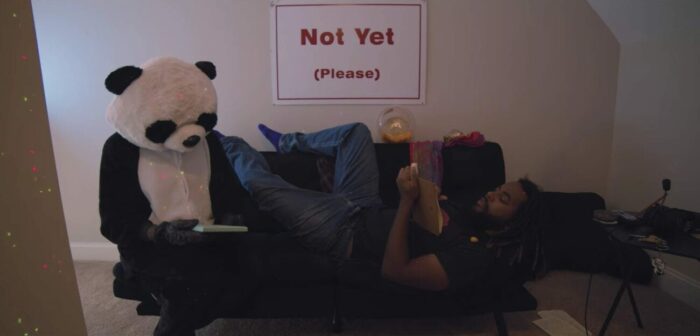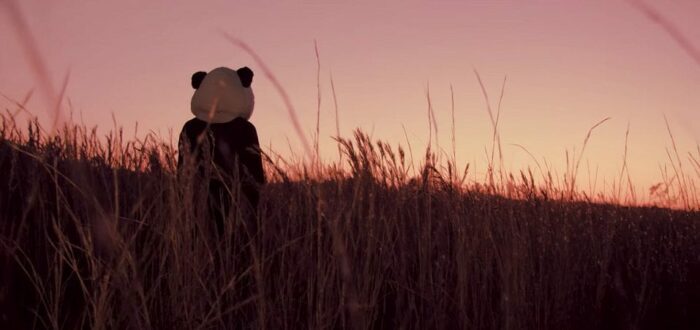Grief affects us in many ways. Some people lash out and get angry, some become numb. That’s definitely the case for Kamus, the main character in Evan Kidd’s microbudget film Panda Bear It. Dealing with the loss of his girlfriend Destiny, he finds his connection to his creative endeavors (rapping) has been severed and he spends most of his time lounging around eating cheese balls. His family encourages him to talk about it but he’s just not interested.
Then there’s the panda bear mascot that keeps following him around. No one else can see it, of course, and it annoys the heck out of Kamus, telling him what to do and poking fun at him when he skips out on work and other responsibilities. He really can’t be bothered though. What’s the point? He’s just going through the motions.
People in mascot costumes are used in a variety of ways in film. In It’s All Gone Pete Tong a giant badger represents Frankie’s drug abuse until he eventually kills it, and unmasks the creature to reveal his own face. In Panda Bear It, the panda is a constant reminder of Kamus’s loss, his companion through grieving. It’s irritating at some moments and loving in others—mirroring how he himself feels.

It comes as no surprise he eventually loses his job, letting his life spiral even more. Kamus takes his grandma’s car and runs away for a few days, camping in the woods. The panda follows him everywhere he goes. Damien Elliot Bynum (as Kamus) does a good job of being completely done with everything—he’s given up, and accepted this is his life now. He also has a kind of hilarious annoyed sigh when having to deal with the mascot. You can feel his irritation.
The film drags a bit here, with Kamus meeting some random hobos (I assume) in the woods who steal his stuff and make fun of his writing (he regularly opens his notebook to try to write lyrics). Way to kick a man when he’s down. He wanders around until he meets a local farmer, a big man with an even bigger beard, who tells him of his own loss, the loss of his father. The two connect and Kamus finally has a way to express how he feels about Destiny’s passing. We never find out exactly what happened to her, but from the sounds of it, her death was sudden and unexpected.
In some ways, this is harder to deal with. It reminded me of one of my own stories of loss. A few years ago a friend of mine fell into a sudden coma and passed away a week later. She was otherwise healthy, in her late 20s. I didn’t know how to deal with it. The realization that you can lose someone for seemingly no reason really hit me hard. I felt like things were pointless—what if I just died the next day anyway?
What the farmer helps Kamus realize (and what I too realized after the loss of my friend) is why not keep going? It doesn’t have to be a big thing. You can find joy again, in new ways. Sometimes all it takes is time to get to that place. It’s okay if it takes a while to get there. And that’s something we’re all going through right now, thanks to world events. It’s hard to know someone who hasn’t lost a loved one right now. Kamus is no exception, for different reasons of course. It’s a reminder that as individuals we are all on our own journeys, full of life and everything that comes with it.

I’ve said it before but I love that films come in all shapes and sizes, from ones with budgets as big as a countries GDP to microbudgets telling small stories. Creating something gives it meaning, gives it a purpose no matter what. Panda Bear It feels genuine and open to looking at a realistic way of dealing with grief. It’s not always tears—it’s sometimes apathy or self-destruction. To follow a black man on his journey through it is even more poignant, because of gender and racial stereotypes revolving around men and showing/feeling their emotions.
Things begin to look up for Kamus, thankfully. He finishes writing his song, he gets his job back. He finally opens up to his grandmother about what he’s going through. He looks back on joyful moments and can laugh instead of cry. While recording his song, the Panda reveals itself to be Kamus’s departed girlfriend, Destiny. She tells him “you’re not alone.”
As much as we feel disconnected physically and socially right now, this is a message to remember. You are not alone. If you’re struggling with loss, reach out to someone. It doesn’t have to be a heavy conversation. The act of reaching out is powerful in and of itself. That’s what I take away from Panda Bear It.


